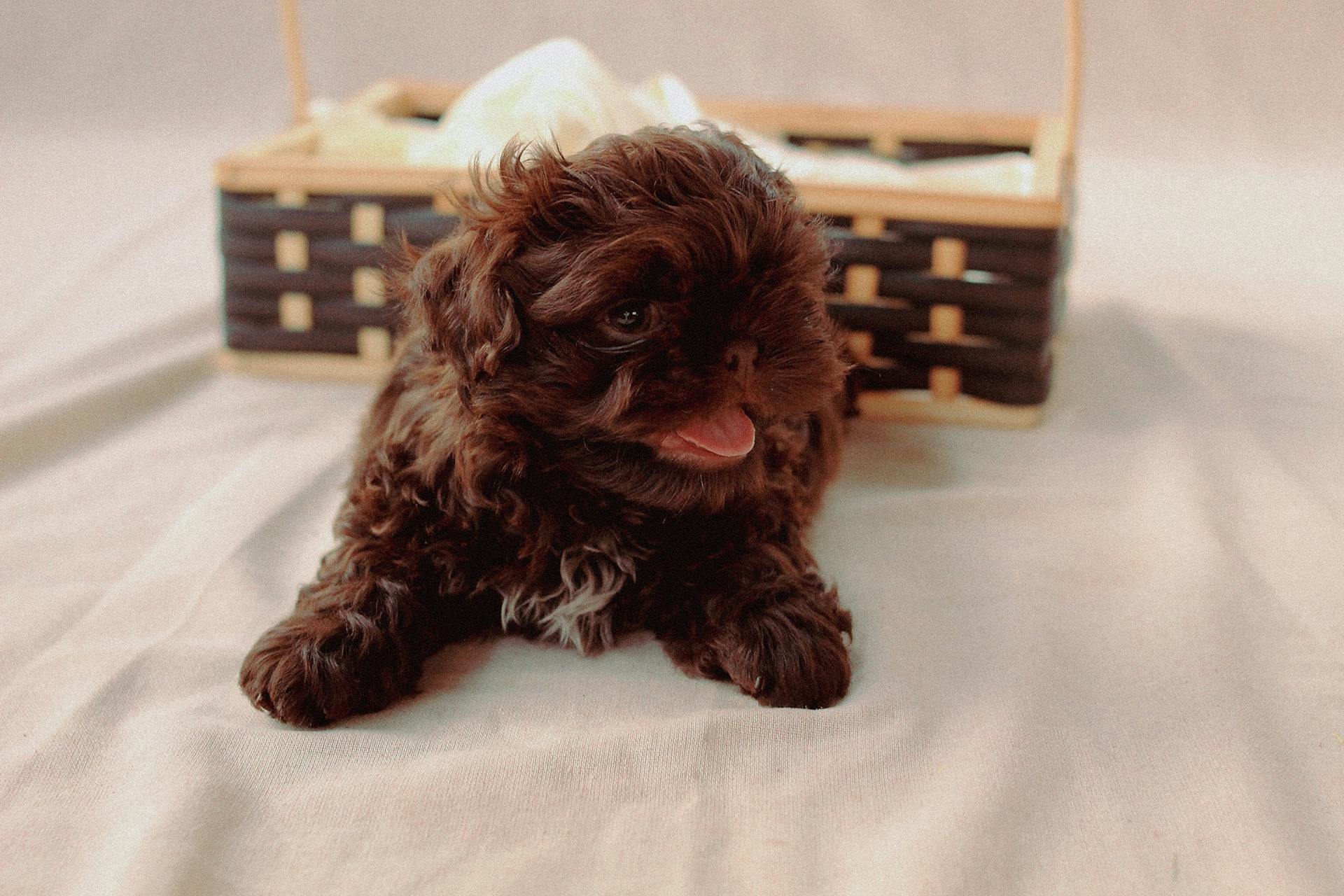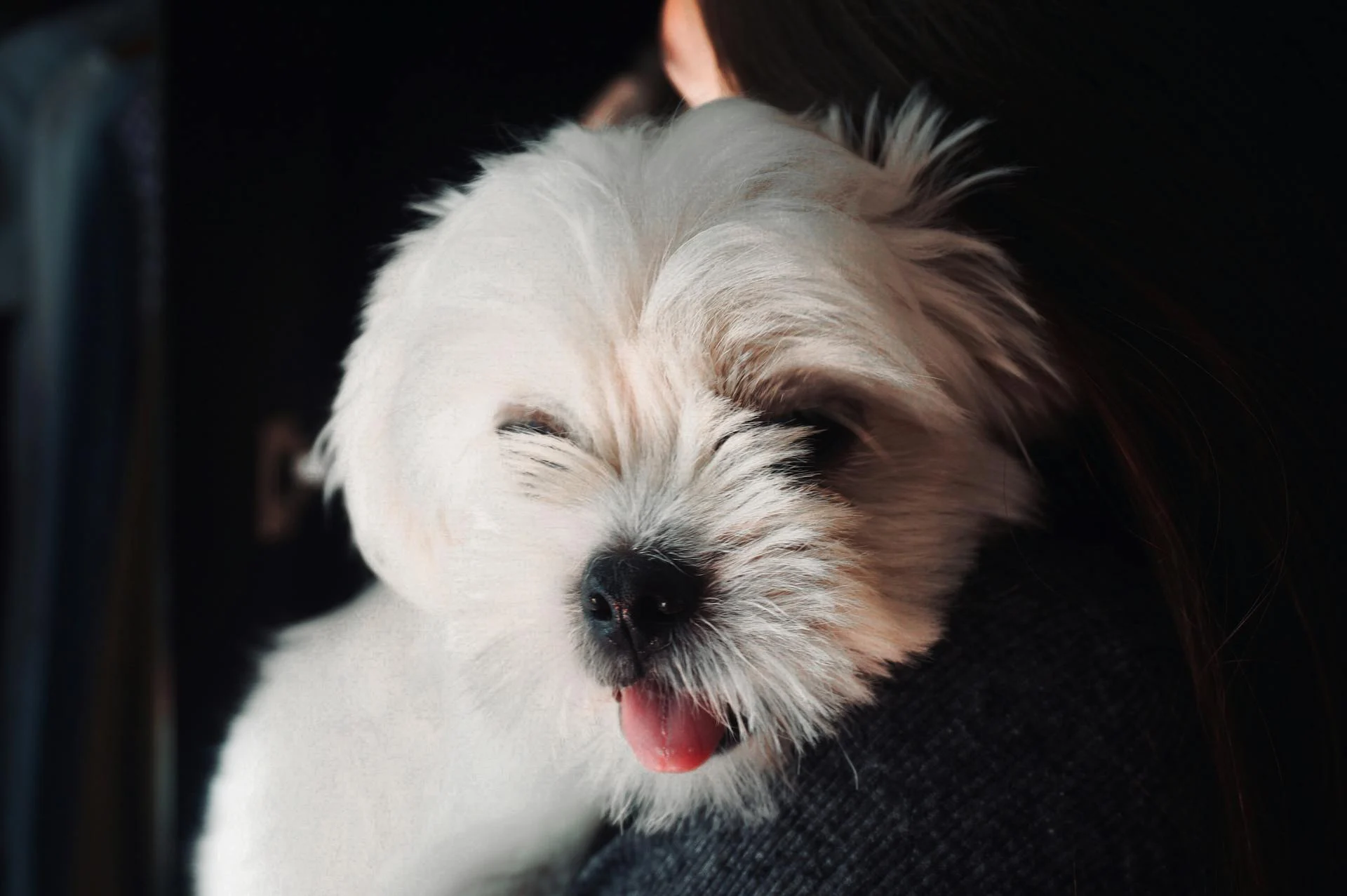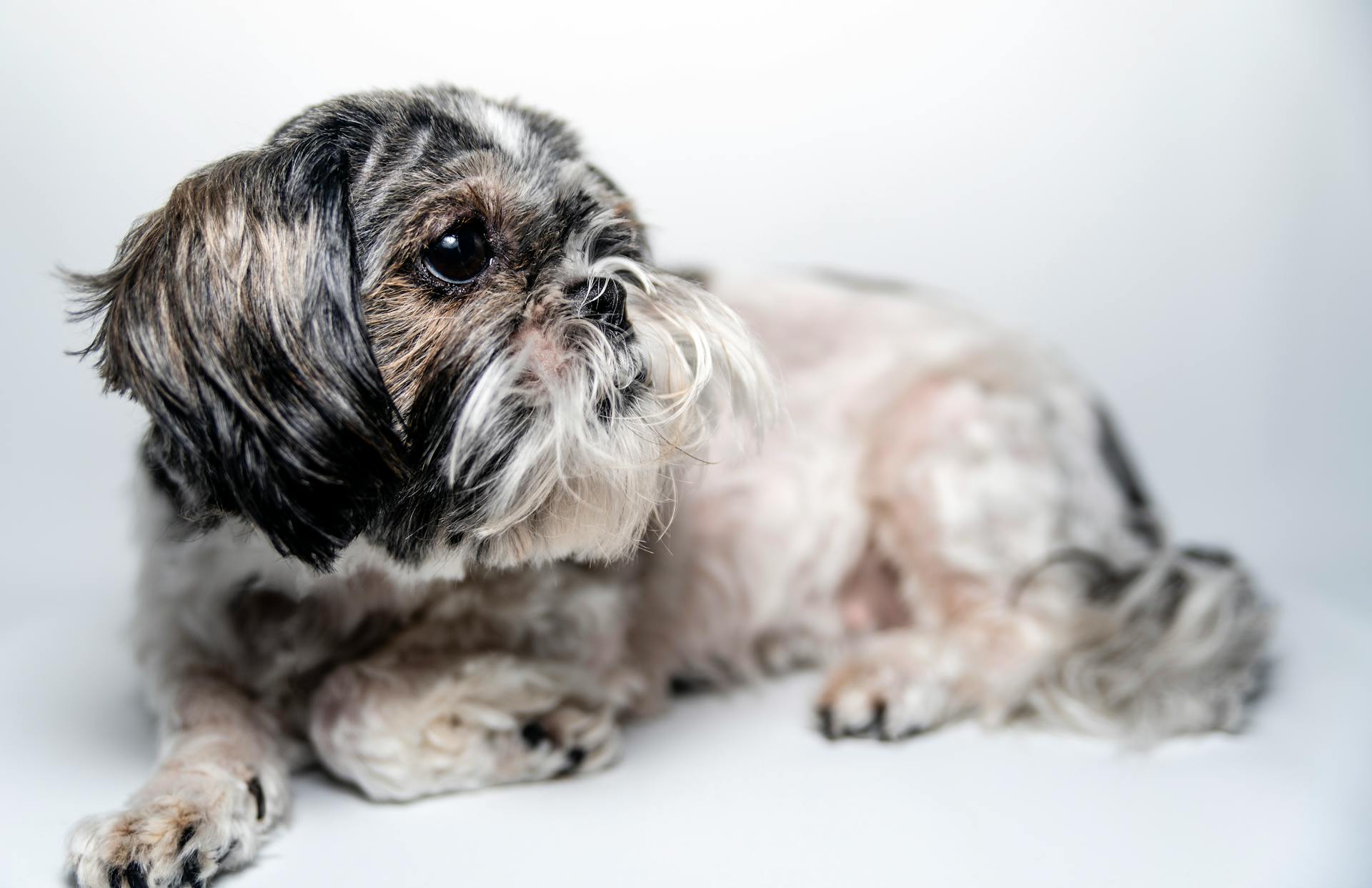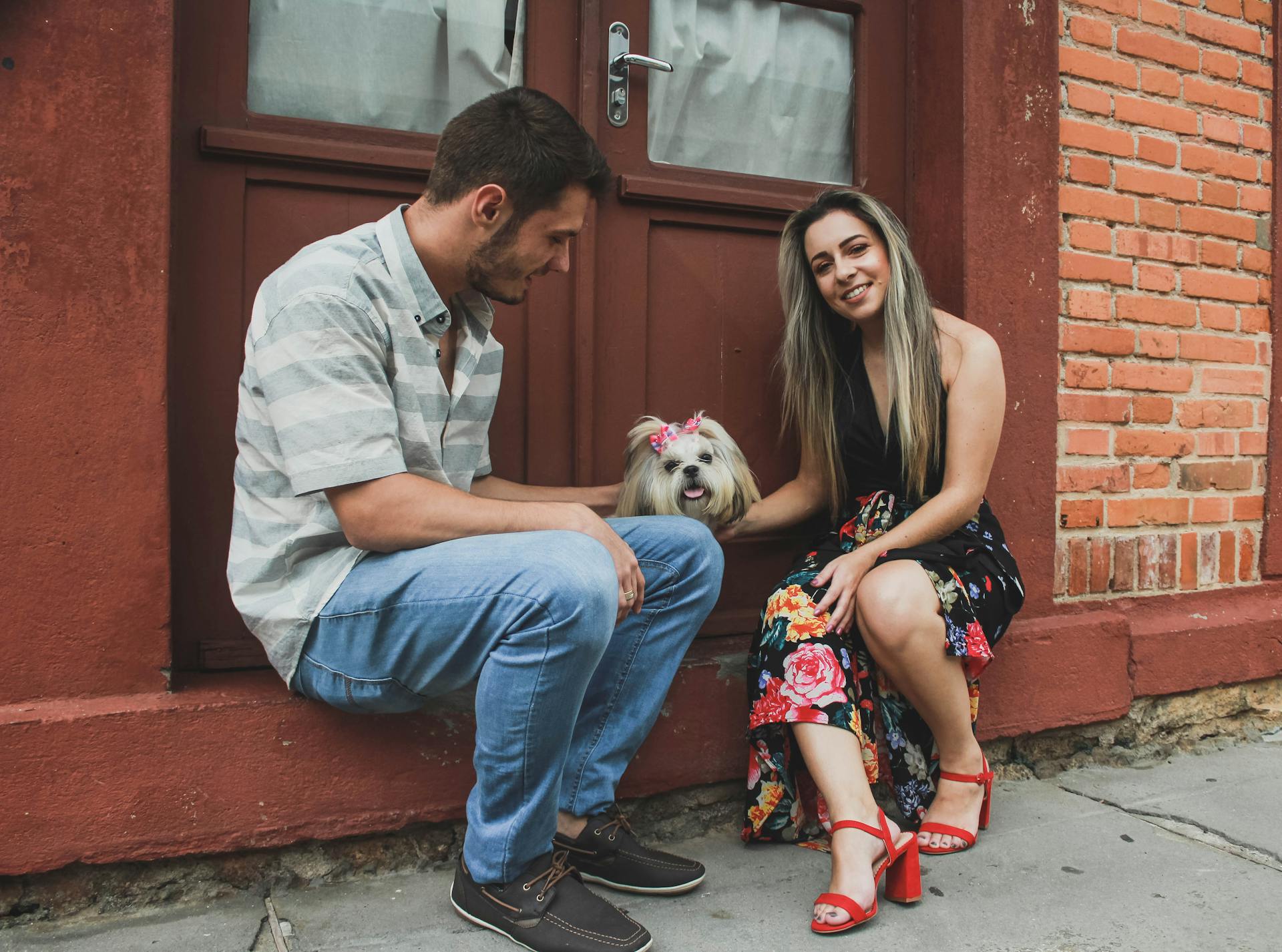
The Shih Tzu is a beloved breed known for their friendly, outgoing personalities. They typically weigh between 9-16 pounds and stand 8-11 inches tall at the shoulder.
Shih Tzus are well-suited for apartment living due to their calm nature and relatively low exercise needs. They require daily walks but can thrive in small spaces.
Their long, flowing coats require regular grooming to prevent matting and tangling. Shih Tzus need to be brushed several times a week to keep their coats looking their best.
Appearance
The Shih Tzu's appearance is truly fit for royalty, with a luxurious silky double coat that's a joy to behold. Their coats are a mix of black, white, grey, and even gold, making each dog a unique and stunning individual.
Their silky coats require regular grooming to prevent matting and tangling. This can be a significant time commitment, but it's worth it to keep your Shih Tzu looking and feeling their best.
Shih Tzus have a regal bearing that's hard to resist, and they often act like they're part of the royal family too.
Personality
The Shih Tzu is an affectionate, playful, and intelligent dog. They can be independent and wary of strangers, so it's essential to socialize them well.
Shih Tzus are incredibly smart, but they can be stubborn at times. This can make training a bit challenging, but with patience and consistency, they'll enjoy learning.
They have a natural friendliness, confidence, and affectionate demeanor, making them great family dogs. This also means they're loyal to their family and don't get tired of them.
Some Shih Tzus can be very independent and require more training and socialization. They might not listen to you or eat all their food when you want them to, but this is not a malicious act – it's just their personality.
Shih Tzus are happy with simple love and affection from their family, and they're not known for running away or becoming bored. This makes them a great choice for families with small children who can pick them up and carry them.
Take a look at this: Training Shih Tzu Puppies
History and Origins
The Shih Tzu dog breed has a rich and storied history that spans over 1,000 years. The breed's ancestry goes back even further, with records showing that short, square dogs existed in China as early as 1000 B.C.
These early dogs were likely the ancestors of the Shih Tzu, and were often depicted in Chinese art and tapestries. You can find paintings and art of these short and stout lapdogs in China dating back to 1000 BC.
The name Shih Tzu means "little lion" in Chinese and Tibetan culture, and is said to have originated from the Tibetan Buddhist goddess of learning. According to legend, the goddess traveled with a small lion dog that could turn into a full-size lion.
Discover more: Shih Tzu Characteristics
History
The Shih Tzu breed has a rich and fascinating history that spans over 1,000 years.
The breed's ancestry dates back to 1000 BC, with records showing short, square, and stout dogs existing in China during that time.
You might like: Dog Breed Shih Tzu
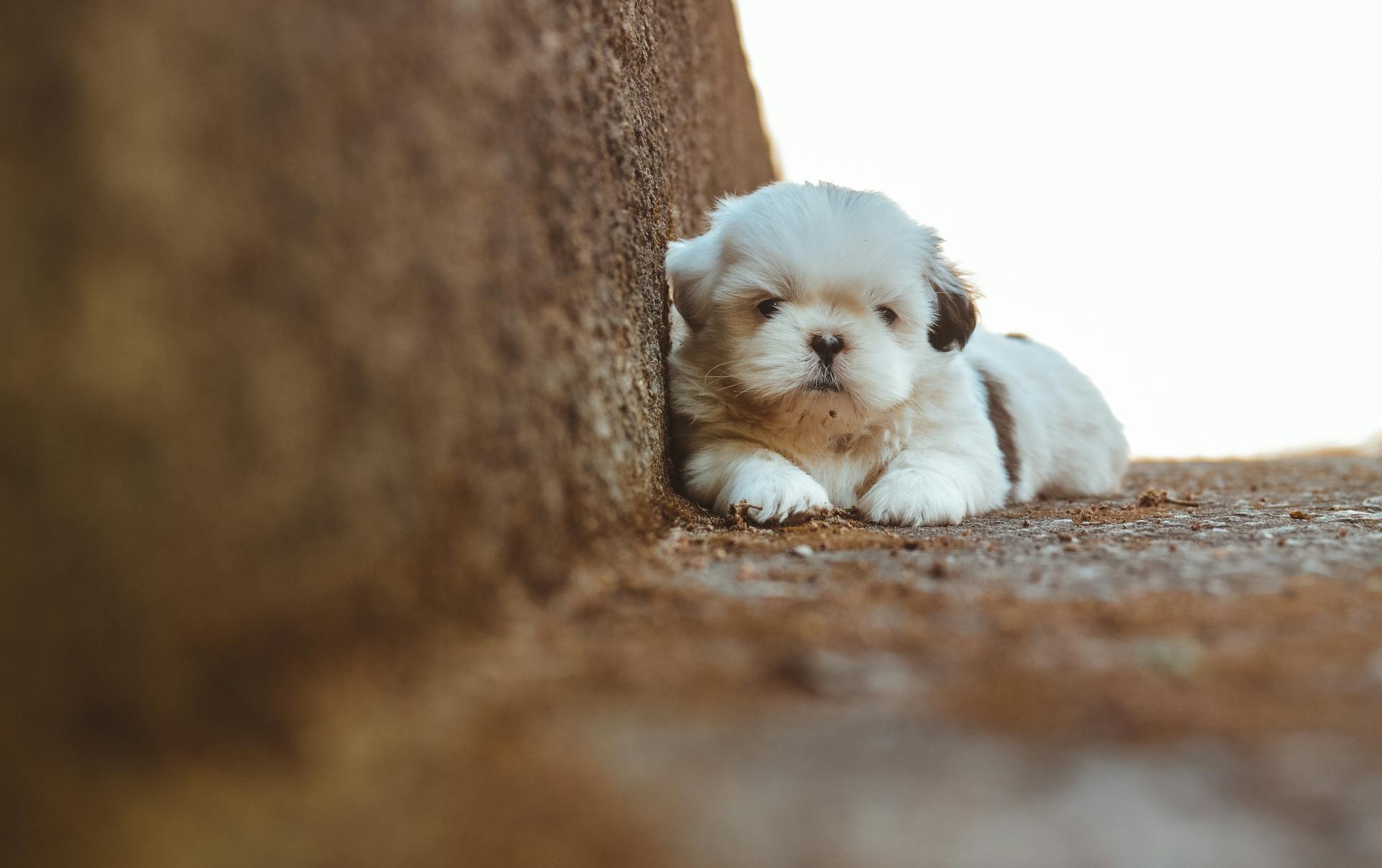
These early dogs were likely the ancestors of the Shih Tzu, with some experts speculating that they originated from the neighboring country of Tibet.
The name Shih Tzu, which translates to "little lion" in Mandarin, was given to the breed due to its association with the Tibetan Buddhist God of Learning.
According to legend, the goddess traveled with a small lion dog that could transform into a full-sized lion, and the breed was likely named after this mythological creature.
The Shih Tzu was a highly prized breed in ancient China, with many Chinese dynasties keeping them as companion dogs and treasured pets.
In fact, Shih Tzus were so cherished by Chinese royalty that they were often kept hidden from the public eye, and were even kept in sleeves or placed on the feet of their royal human companions to help generate heat.
Empress Tzu Hsi, who ruled China in the late 1800s, was a significant figure in boosting the popularity of the Shih Tzu breed, and even created a strict breeding program to create her ideal "Imperial Dog".
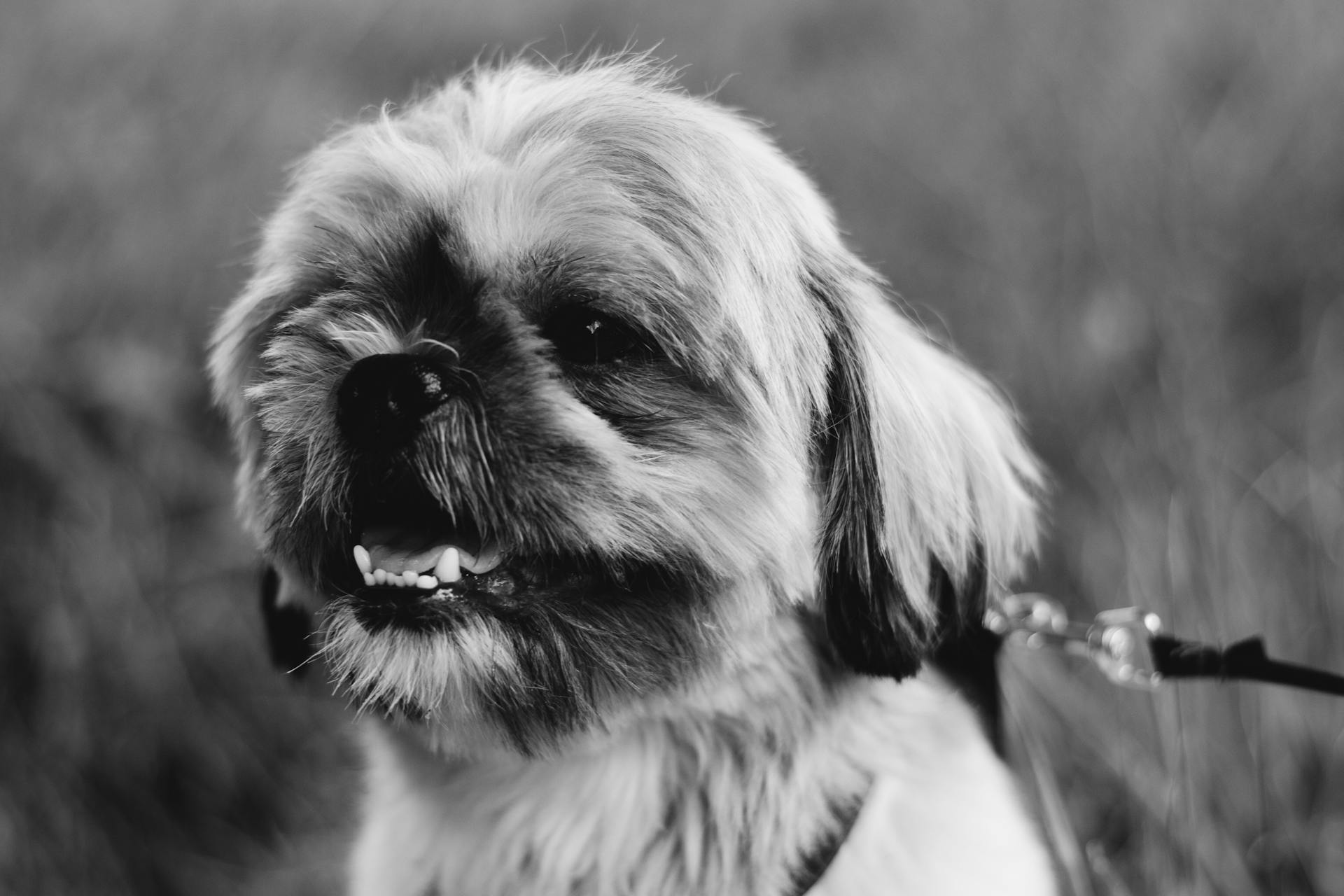
Her breeding program led to an increase in popularity for Shih Tzus across the nation, but unfortunately, it also led to poor breeding practices and a decrease in breed quality overall.
Despite this, the Shih Tzu breed has continued to thrive, with the breed being officially recognized as a separate breed from the Lhasa Apso in 1940 by the Kennel Club (UK).
Take a look at this: Breeding Shih Tzu
Modern-Day
The modern-day Shih Tzu has a fascinating history. The first Shih Tzus arrived in the western world in 1928.
Lady Brownrigg of England is credited with creating the first Shih Tzu kennel, which helped popularize the breed. She played a significant role in introducing the Shih Tzu to the world.
The popularity of the breed soon made its way to America, where Shih Tzu clubs began to pop up all over the United States.
Exercise and Health
Exercise is crucial for Shih Tzus to maintain a healthy weight and prevent various health issues. They are best suited for short walks and playtime, with three 20-minute strolls being ideal.
Shih Tzus should never be exercised on hot days due to their short nose and flattened face, which makes them prone to overheating. Heavy exercise in warmer temperatures should be avoided to prevent heatstroke symptoms like heavy panting, drooling, bright red tongue or gums, rapid pulse, and wide, panicked eyes.
A daily walk of 20 minutes is sufficient for Shih Tzu puppies six months or older, with fully grown Shih Tzus requiring two walks a day, lasting 20-30 minutes each.
Here are some benefits of exercising your Shih Tzu:
- Aids in a good night's sleep
- Helps your dog release energy or pent-up anger
- Allows a dog to engage their senses, leading to a more emotionally satisfied dog
- Outdoor exercise can enable a Shih Tzu to be exposed to stimuli, leading to less reaction
- Improves your dog's lifespan
Regular exercise can also help reduce the risk of orthopedic problems like hip dysplasia and luxating patella.
Exercise Requirements
Exercise requirements for Shih Tzus are relatively low, with short daily walks being the best option. They can get enough exercise with just a 20-minute stroll.
Shih Tzus should never be exercised on hot days due to their short nose and flattened face, which makes them prone to overheating. Heavy exercise should also be avoided to prevent health issues.
A daily walk of 20-30 minutes is ideal for a grown Shih Tzu, with more active dogs able to have up to three walking sessions per day. However, overworking your Shih Tzu should be avoided.
To ensure your Shih Tzu gets the best workout, sticking to a schedule can help build a daily routine they look forward to. Keeping an eye out for heatstroke symptoms, such as heavy panting, drooling, and a bright red tongue or gums, is also crucial.
Here are some ideal activities for Shih Tzus:
- Rally Obedience
- Trick Training
- Conformation
- Canine Freestyle
- Small Dog Agility
Daily training for obedience and tricks, as well as providing puzzles or interactive toys, can help provide mental enrichment and keep your Shih Tzu's brain sharp. This can prevent unwanted behaviors like destructive chewing.
Health Concerns
Shih Tzus are generally healthy, but they can be prone to certain health concerns.
Their brachycephalic syndrome can lead to breathing difficulties, especially in hot or humid weather, causing snoring, wheezing, or even more severe respiratory distress.
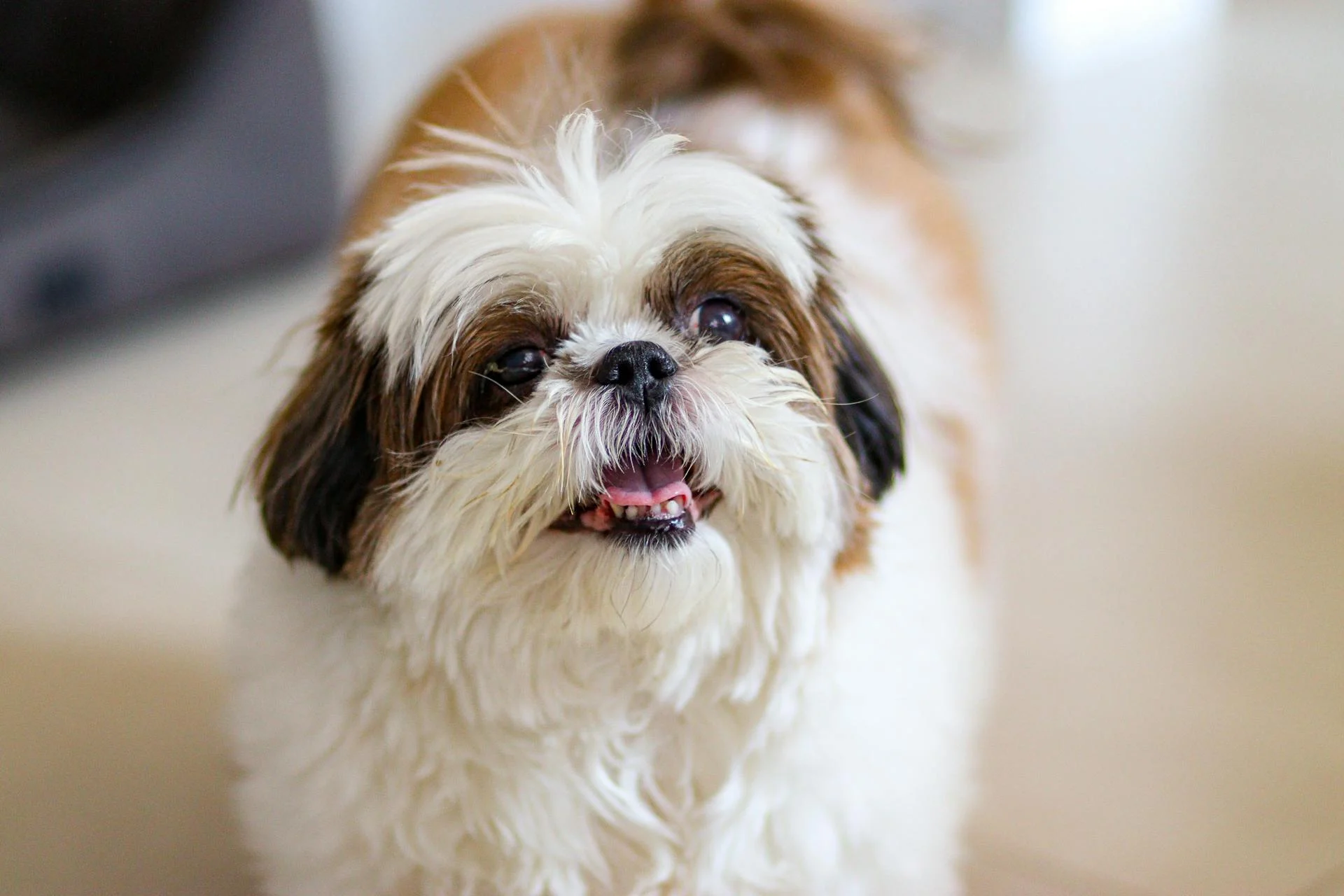
Regular eye examinations by a veterinarian are crucial to catch and manage ocular issues, such as corneal ulcers, progressive retinal atrophy, and dry eye syndrome.
Shih Tzus are also at risk for dental problems, including tooth overcrowding and be challenging to clean, which can lead to dental decay and gum disease.
Regular dental care, including brushing and professional cleanings, can help prevent these issues.
Skin allergies are another concern, causing itching, redness, and hair loss, and can be managed by identifying and avoiding potential allergens and getting veterinary treatment.
Maintaining a healthy weight and providing regular, low-impact exercise can help reduce the risk of orthopedic problems like hip dysplasia and luxating patella.
A balanced diet and regular exercise regimen are essential for keeping Shih Tzus happy and healthy throughout their lives.
Their large prominent eyes make them prone to damage, such as scrapes and cuts, and can lead to conditions like keratitis and proptosis distichiasis.
Nutrition and Feeding
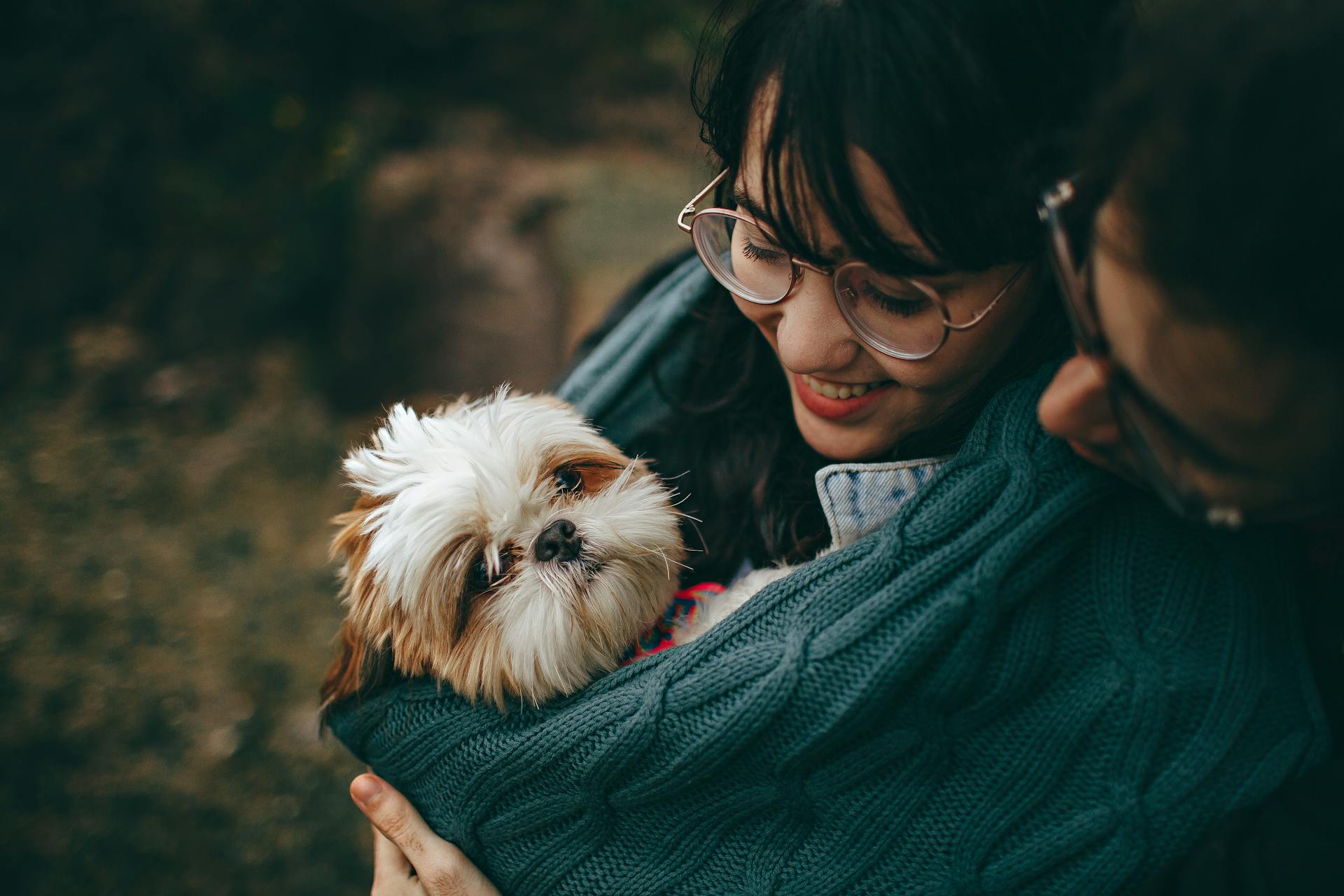
Small dogs like the Shih Tzu have a fast metabolism, burning energy at a high rate. This means they need to eat frequently to keep their energy levels up.
Their small stomachs can only hold so much food, so they must eat little and often. This can be challenging, but the right food can make a big difference.
Small-breed foods are specifically designed to meet the needs of small dogs. They have smaller kibble sizes to suit smaller mouths, which encourages chewing and improves digestion.
Proper nutrition is crucial for a Shih Tzu's overall health and can contribute to a long and healthy life. With the right food and care, a Shih Tzu can live up to 16 years.
Discover more: What Can a Shih Tzu Eat
Care and Grooming
Shih Tzus require a lot of daily grooming to keep their coat looking its best.
Their long, soft, and dense coat needs to be brushed regularly to prevent matting.
It's essential to brush their teeth daily, and at least three times a week, to prevent serious problems.
Recommended read: Shih Tzu Coat
Shih Tzus can be sensitive to very hot temperatures, so it's best to avoid spending long periods in extreme heat.
They need to be bathed frequently, sometimes as much as once a week, and dried completely.
To keep their coat clean and neat, many owners hire a professional groomer every six to eight weeks.
Here's a list of essential grooming tools for Shih Tzus:
- Pin comb
- Pin brush
- Slicker brush
Regular grooming also includes cleaning their ears weekly and washing their faces daily to prevent food and particles from getting stuck in their hair.
Behavior and Training
Shih Tzus can be clever dogs who enjoy learning tricks and games, and should be trained to walk on a harness and lead as well as come back when called.
Despite their small size, Shih Tzus are surprisingly game and love to chase squirrels or even the neighbor's cat. They need early socialisation to gain confidence with people and other dogs.
House training for a Shih Tzu is one of the most difficult things found out by dog owners, as they have a hard time waiting for their owners to let them out to use the bathroom.
Shih Tzus love being companions, which makes training a joy with this fun-loving breed. They're smart and quite athletic, even at their small size, and love to learn new things.
Daily training for obedience and tricks are a great way to provide mental enrichment and keep their brain sharp, as well as providing puzzles or other interactive toys.
Socialization
Socialization is a vital part of raising a well-adjusted Shih Tzu.
Exposing your puppy to various environments, animals, and people helps them become comfortable with new experiences and reduces anxiety in unfamiliar situations.
Taking your puppy to many places and giving them treats throughout the trip can make them feel at ease going out.
Positive reinforcement is an effective way to train a puppy, so be sure to give them plenty of praise, dog treats, and head scratches.
Shih Tzus are known for being outgoing and social, but proper socialization is still essential to help them thrive.
Proper socialization includes exposing your puppy to new sights, sounds, people, dogs, and other animals from a young age.
This can help them get along well with children, especially if they're properly introduced and socialized as a puppy.
Readers also liked: A Shih Tzu Puppy
Fun Facts and Pop Culture
The Shih Tzu breed has a rich history and unique characteristics that make them stand out. They're known as "chrysanthemum-faced dogs" due to the way their hair grows in every direction on their face.
Their original Chinese breed standard is quite poetic, describing them as having the head of a lion, the face of an owl, and the eyes of a dragon. It's a romantic description that captures the breed's unique features.
Shih Tzus have a special spot on their head, known as the "Star of Buddha", which is said to have originated from a legend about Buddha and his loyal companion. The spot is a white mark on the dog's forehead, said to be a sign of good luck.
The breed has made appearances in pop culture, thanks to their friendly nature and glamorous appearance. They're a beloved breed around the world, and it's no wonder they've been featured in various forms of media.
Fun Facts
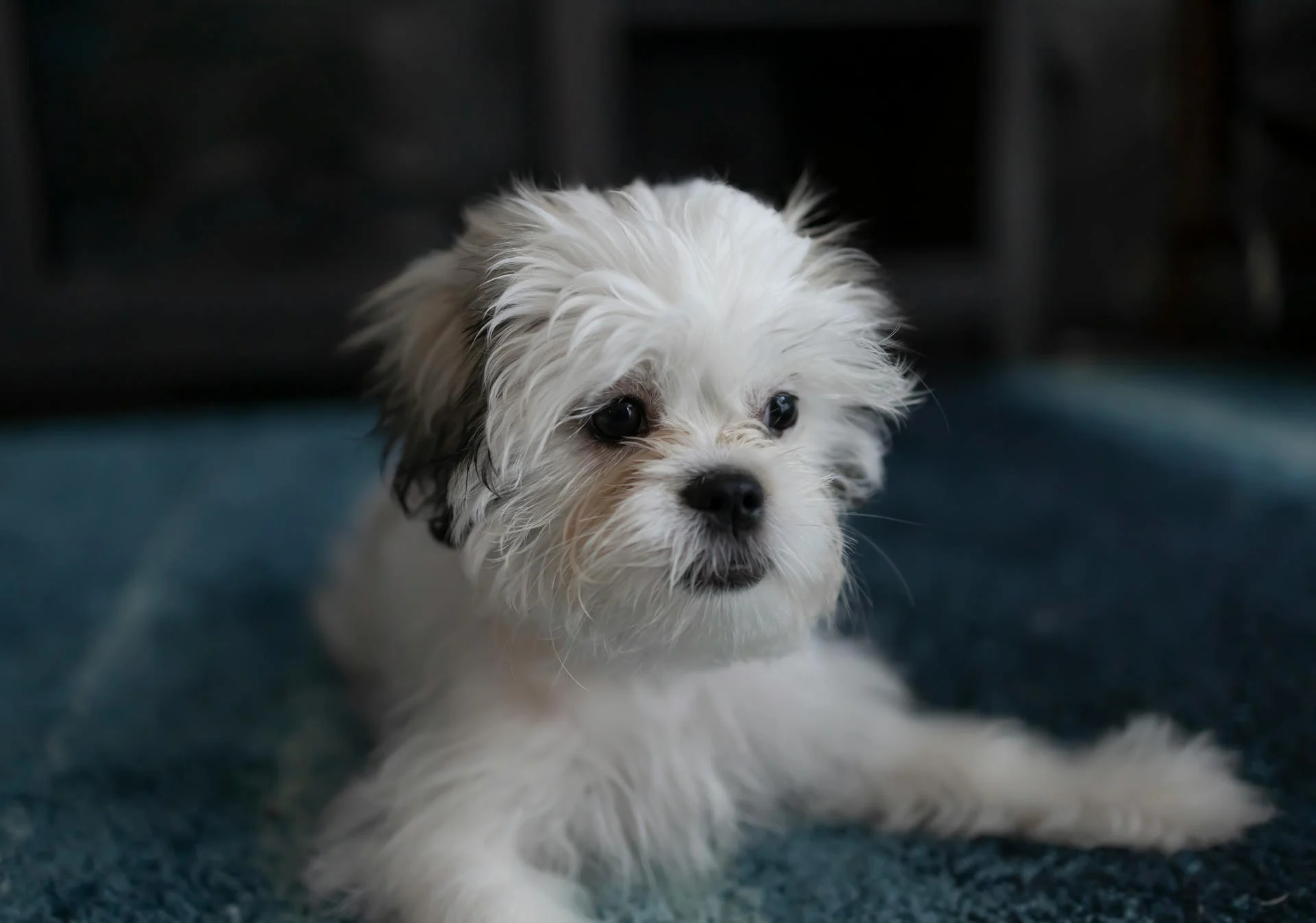
The Shih Tzu breed has a rich history and unique characteristics that make them a fascinating topic. They're known as "chrysanthemum-faced dogs" because of the way the hair on their face grows in every direction.
The original Chinese breed standard for the Shih Tzu is quite romantic, describing them as having the head of a lion, the face of an owl, the eyes of a dragon, and the tongue of a peony petal. It's a pretty poetic description!
Shih Tzus have a special spot on their head called the "Star of Buddha", which is said to be a mark left by Buddha himself. According to legend, Buddha's Shih Tzu companion transformed into a lion to chase away robbers, and Buddha kissed the dog on the forehead in thanks.
Here are some fun facts about the Shih Tzu breed:
- The name "Shih Tzu" comes from "shih-tzu kou" or "lion dog" in Chinese.
- Shih Tzus have hair that's more similar to human hair than fur found in most canine breeds.
- They're brachycephalic, meaning they have a shortened muzzle or "flat-face."
- Shih Tzus can live between 10 and 16 years and typically weigh between 9 and 16 pounds.
Pop Culture
The Shih Tzu has made a name for itself in pop culture, and it's easy to see why - its friendly nature and glamorous appearance make it a favorite among celebrities and fans alike.
Many celebrities have been spotted with Shih Tzus, including Nicole Richie, Mariah Carey, Beyoncé, Colin Farrell, Bill Gates, and even Queen Elizabeth II, who have all fallen in love with the breed.
The Shih Tzu's popularity in pop culture is a testament to its enduring charm and appeal.
Organizations
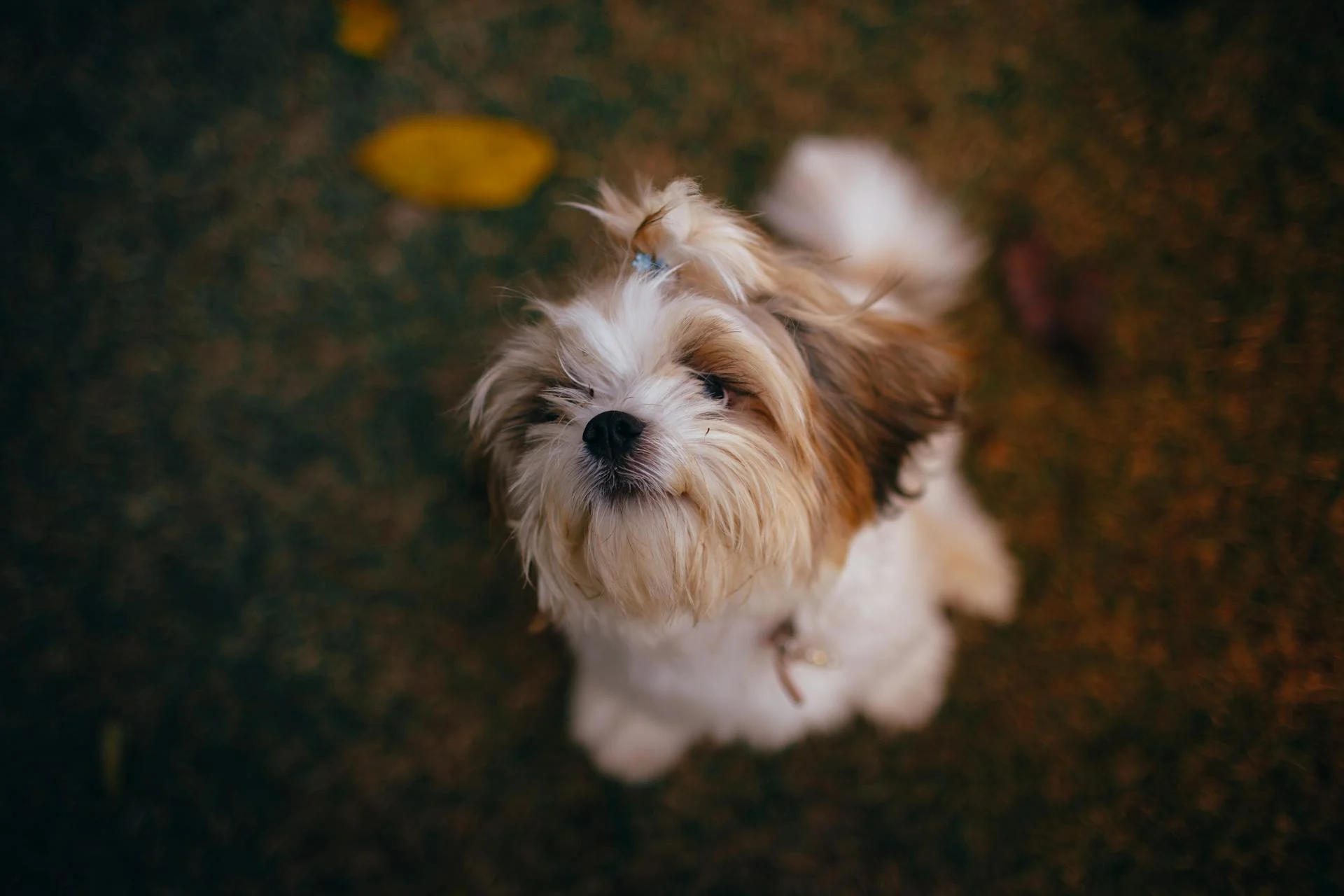
There are many organizations dedicated to helping Shih Tzus in need.
Rescue groups like Colorado Shih Tzu, Maltese and Lhasa Apso Rescue, Fuzzy Pawz Shih Tzu Rescue, and Shih Tzu and Furbabies Rescue work tirelessly to save and rehome unwanted or abused Shih Tzus.
If you're looking to adopt a Shih Tzu, these organizations are a great place to start.
Some notable rescue groups include:
- Colorado Shih Tzu, Maltese and Lhasa Apso Rescue.
- Fuzzy Pawz Shih Tzu Rescue.
- Lone Star Shih Tzu and Lhasa Apso Rescue.
- Peke A Tzu Rescue.
- ResQ Animal Coalition.
- Shih Tzu and Furbabies Rescue.
- Shih Tzu Rescue.
Breed organizations like the American Shih Tzu Club are also a great resource for Shih Tzu enthusiasts.
These organizations provide valuable information on events, meetups, breeding, and training, as well as referrals for videos to help you learn more about your dog's needs.
Frequently Asked Questions
What are the 14 types of Shih Tzu?
There are 8 recognized types of Shih Tzu, including Imperial, American, Black, European, Teacup, Japanese, Brindle, and Brown. Each type has its unique characteristics, but all share the friendly and outgoing personality of the Shih Tzu breed.
What is the rarest type of Shih Tzu?
The rarest type of Shih Tzu is a completely black one without any white markings, making it a highly sought-after and uncommon breed.
What two dogs make a Shih Tzu?
The Shih Tzu is believed to be a cross between the Pekingese and Lhasa Apso breeds. This unique ancestry dates back to the Chinese royals of the Ming Dynasty.
Featured Images: pexels.com
